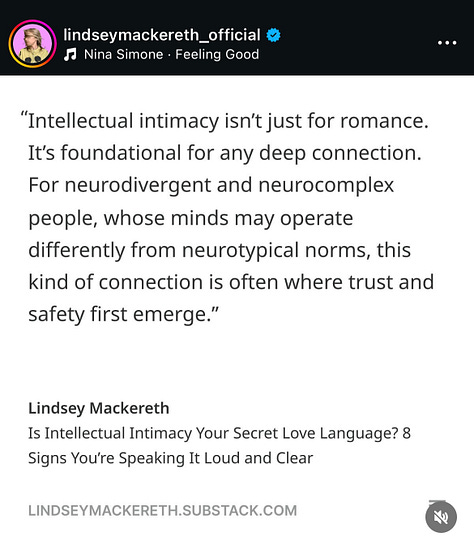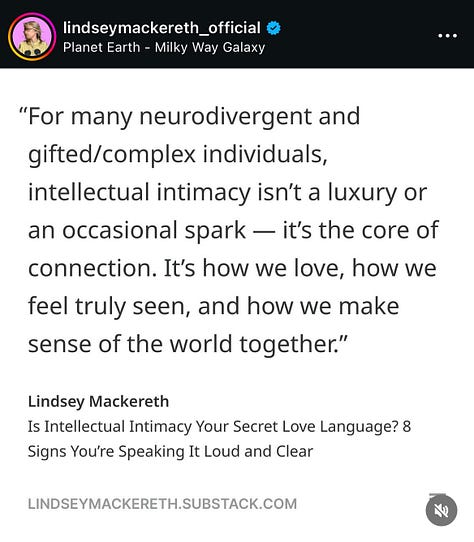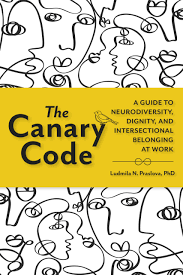More from f*ck i love you
the fily (audio)files audio essays | Spotify | Apple Podcasts
f*ck i loved that the pod | Spotify | Apple PodcastsIf you prefer, you can listen to me read this week’s Note from Jenn.
o0. Contents
o1. This Week’s Holy F*ck Moments
o2. Note From Jenn (it’s an essay this week and I really recommend it. Read below or listen above.)
o3. Today’s Notebook
o1. This Week’s Holy F*ck Moments
“The future isn’t built by linear thinkers maintaining broken systems — it’s built by divergent ones sensing what’s coming before it arrives.”
Divergents aren’t glitchy — we’re adaptive infrastructure in disguise.“Neurodivergent minds are like cognitive mycelium — sensing, connecting, and adapting in ways centralized systems can’t.”
What if what looks like disability is actually intelligence designed for polyculture futures?“When AI meets neurodivergence, it’s not assistive — it’s symbiotic.”
We’re not resisting the machine. We’re rewiring it from the edges.
o2. Note From Jenn
Oh friends. I’ve got some big stuff on the brain today. Buckle up. This will for sure be an essay not a note.
Last Week’s Episode
Reflections on This Week’s Episode
I’ve been on an autistic nerd joy tear this morning, discovering and hyping a bunch of new-to-me Substackers. I’ve probably read twelve new pieces, four of which got added to this week’s already-packed episode notebook. I also put out three1 super enthusiastic notes about these discoveries. I might combust in the best way.
This is what happens when I am allowed my intellectually-fuelled joy.
I say ‘allowed’ because ever since my episode last fall — which involved A LOT of posting to social media — I have become hyper sensitive to how often and how joyfully I post online.
Substack is a bit of a haven for me in this way. Only a small percentage of you witnessed the events of last fall and ya’ll are so kind and supportive. I feel much more permission to be full nerd at whatever volume I pick each day.
The community that witnessed 1.0 and did come back here with me for 2.0 are mostly people who love and trust me; people who can mostly tell the difference between me being unwell, and just being in my nerd joy.
If I’m honest though, some days it’s hard to remember that. I have a very keen internal surveillance system that’s not just of my own making. There are some ‘waiting for the other shoe to drop’ vibes in some of my relationships. I also have a small and perhaps unfounded — but quite reasonable concern that some people subscribed to monitor me more than meet me where I am today.
I try not to take any of it personally. It’s very understandable. There is shared trauma at play, a reciprocal reverb that, like an echo, will take time to quiet.
If it was up to me I’d post an essay most days, and share every one to my instagram. Instead I sort of begrudgingly schedule one long form piece and this podcast. Two posts per week is all I’m allowing myself.
Perhaps counterintuitively for those not wired this way, that restraint is occasionally excruciating. Interestingly, I have deviated from the 2-posts per week rule only once but it turned out to be the one that touched the most people and generated the most enthusiastic feedback. I published it out of rhythm on a Saturday because I could feel that it mattered. It turned out I was right.
My strategy to temper concern had been to publish it web-only and not push to email. Somehow it still became my most popular piece, bringing up a whole other curiosity about what the (perhaps negative) impact is of only partially sharing one’s gifts with the world because those gifts cannot always be shared in a way that keeps everyone comfortable, however warranted that may be. It is also why I rarely share any of work to instagram anymore either.
All to say, it’s really, really, challenging to perform wellbeing in ways that are counter to my nature.
It’s also kind of heartbreaking for me.
When Head and Heart Are A Single Entity
I’ve written elsewhere about realizing how deeply my experience of the world is shaped by emotional cognition — I don’t just get excited by ideas or thinking deeply, I have think and express to feel.
I need to analyze, reflect, discuss, dialogue, think and write to connect — with myself and others.
calls this intellectual intimacy and it is very much my primary way of being. But I am a statistical minority in this way. Being a long-form, meaning-making human in a short-form world can be profoundly lonely, often heartbreaking as Lindsey explains in the quoted passage below.Complex thinking isn’t just about high intelligence or excelling at school. For many adults, it shows up as a kind of intensity:
Emotional depth;
A fast-moving, analytical mind;
A hunger for meaning, truth, and authenticity;
A tendency to deeply process, to feel “too much,” or to see ten layers where others see one.
These qualities can make complex thinkers insightful, empathetic, and deeply loving partners. But they can also lead to a kind of inner loneliness — even in happy, stable relationships — because the way complex thinkers experience the world is often too multifaceted, too fast, or too deep to fully share.
It’s no coincidence that all of my deepest relationships — romantic and platonic alike — are with other predominantly intellectual feelers.
For fun — because I find analysis fun — I analyzed my past partnerships: 83.33% — five out of six — of my big loves were with other ‘sapiosexuals’ I’ll call us, people who find intelligence sexy, whose arousal is largely cognitive. Four of six of those men are fellow divergents. Birds of a feather and all that.
Knowing how ‘normal’ all this is for us autists extra makes me super done with being told this way of connecting is not ok, to “get out of my head”, to pick guys that can “balance” me, that I’m “overthinking” and anything else of the like.



The Joy Police
I’ve also long known that sharing what I learn is my deepest joy. I made this video January 2024 when I was trying to get up the nerve to make video content. I had not been diagnosed yet and was only starting to get curious.
Learning that I am on the spectrum just makes allllllll of this make more sense.
Autistic joy is a known thing in the autism community. It is an intense, uninhibited happiness that comes from deep, focused engagement with a passionate interest. For me, that interest has always been the exhilarating process of learning and — critically — sharing and connecting over ideas.
When you add ADHD in, it gets even more wild because my brain doesn’t just like to go deep, it also likes to go wide. I know a little bit (and a lot) about a lot.
Left to my own devices, unmasked, my happiest place is alone with information. My second happiest place is sharing what I learn in long, deep, uninterrupted dialogues with people who actually want to hear it. I also don’t need to be the only one sharing — the joy is compounded in exponentials by an enthusiastic dialogue partner(s) who is skilled at sharing and listening. It’s a relational process.
My Clifton Strengths Finder is hilariously accurate in all of this. I actually want to know if anyone has mapped neurotypes to this framework. FASCINATING. That’s a side quest for another day though.

Where we are in today’s story is the part where we meet the Joy Police. One is named ‘don’t act manic’ and the other is called ‘don’t talk too long or too fast or too intellectually’.
To say, I try very hard to be self aware, to not hog the mic, to not interrupt (aka cooperatively overlap), to assess for who actually wants to hear it and how to best communicate to be understood: are we speaking in academic, casual pal, measured journalist, relatable confidant, or Surrey Girl2 today?
It’s a whole different kind of code switching; an invisible translation of my ‘native tongue’ to that of the person with whom I’m speaking.
I adapted this reflex so long ago I couldn’t tell you when or how it got installed. Until recently I’ve never considered it might not be “normal”, that not everyone has an internalized surveillance team policing their expression. This is what happens when the messages from the outside become the protective strategies on the inside.
But could you imagine if every time you felt pure joy you had to contain and right-size it?
This has been true my whole life but is especially acute as I rebuild trust with myself and my community post-episode.
I’ve got a new essay in the pipeline about all this, about what I’m calling the translation tax; about the costs and consequences of being forced to translate my complex brain for a linear world. It’s levied every time someone says, “Just get to the point,” when I’m trying to build the context the point relies on, and every time I’m called “too intense” or told I’m “overthinking” when I’m simply… thinking.
The most severe form of this tax came in the form of an auto-immune disease — among other things.
At least when I got my MS diagnosis in 2019 I was “allowed” to slow down. My health-related idiosyncrasies made more sense and became “valid”. There was something concrete to point to about why I couldn’t keep up and cyclically burnt out. I don’t know if we’ll ever know the difference between MS relapses and autistic burnout, but at least MS is something people can sort of understand.
I’ll never forget my good friend and colleague Ajay saying to me in 2015, 10 years before I’d be diagnosed auDHD, after three meeting reschedules:
you’re kind of always sick hey? what’s that about?
What I didn’t know then that I know now is I was always kinda sick, and it wasn’t my fault even if I’ve spent most of my life believing it is.
What was actually true is I was trying to survive systems not built for me.
Systems that make people sick by design.
And if you’re new here and that claim seems outlandish, I recommend reading The Welfare Queen series or any of the other dozens of Substackers writing about this right now. Many of them are featured in today’s episode.
I’ll also be explicit that I think all our systems at this point are anti-human regardless of what kind of brain you have. I have this maybe radical idea/metaphor that AI already took over in the form of bureaucracy and it is sucking the life-force out of us all, Matrix-style.
And while us neurosensitive folks may not be your Morpheus, we are your canaries in the coal mine.
We — along with all the historically excluded folks that are exhausted from saying this — are the ones suffering ‘first and worst’. And we’re trying really hard to let you know there’s toxic fumes down this mineshaft, that if you’re not already affected, you will be. And we bother to try to speak up about our experience not just for ourselves but for all of us impacted by these very broken, very harmful systems we’re all currently sort of trying to survive.



I’ve expressed this sentiment elsewhere as:
I am a bio auntie and a community auntie.
I take my job as an auntie very seriously.
Aunties are a collective species.
We only exist because we are in relationship and connection.
Our care, our love, is for the collective.
As a neurodivergent Auntie, I deeply sense that same collective and thus feel responsibility to what is emergent within it.
And that brings me to the heart of it.
The exhaustion, the sickness, the joy police — it isn't just a personal struggle. It's a symptom of a much larger pathology, one I've come to call corporate narcissism, or The Corporate Narcissist.
Let’s meet him next.
Meet The Corporate Narcissist
I briefly dropped the phrase corporate narcissism in WQ3 without really digging into it, summarizing it thusly:
Narcissistic systems break you, blame you, and then smile politely while doing it. Per their last email.
This was a concept I developed in the fall during my episode in a series of now taken-down essays. Today we will exhume it, giving it the fuller post mortem it deserves.
One of my refrains from those original essays — which I used as a subtitle on a post called The Other Reasons I Quit That Consulting Firm was this:
Narcissistic systems produce narcissistic outcomes by design. We Need a Me Too for the Ninety Nine Percent.
As I said in the note below when I compared
and I’s nearly identical experiences that occurred years and thousands of kilometers apart:Replace “Oregon Health Authority” from Sher’s piece with “BC Public Service” and I could have written this word for word.
That’s because it’s the same system in different places.
It’s the same system because its from the same cultural root directory.
B*tch, Hold My Beer
Before we go further, let’s unpack a few definitions.
Narcissism is a set of Me-First motivations, beliefs and patterns of behaviour, not just a diagnosis.
Most of the organizations and institutions we all grew up in are Narcissistic by design. Especially those that are corporate in nature, including nearly all nonprofits, charities universities and governmental and ‘social’ institutions.
In its broadest sense, a corporate structure, from the Latin corpus for "body," refers to any organization designed to function as a single, unified entity whose own operational logic and self-perpetuation often override the humanity of its individual members. And lest we forget how hard corporations fought to be persons under the law.
It follows then that if individuals persons can be narcissistic so too can corporate persons. And so herein is the Corporate Narcissist: a system that doesn't just serve itself, but, like any narcissist, fundamentally demands that all of reality, including our own humanity, bend to its will.
Thanks to therapy culture going viral, and the pervasive abuse of women in particular, we are getting very skilled at identifying who and what a Narcissist is.
I bet you could stop any millennial aged woman walking down the street of any major city in NA and ask them how to identify red flag behaviours of a narcissist and you wouldn’t be able to finish the question —
Bitch, hold my beer.

Professionals are dedicating their entire careers to the subject and their online followings are in the tens of thousands and even millions.
This is how you know the abuse is systemic not individual.
How else could so many individuals need support healing from one single behavioural pattern, across all classes and races and ages, if it wasn’t systemic?
And this is why I picked this term.
Sure it is highly and precisely accurate, but it’s also culturally relevant. And we need more accessible ways to talk about systems so that anyone who wants to can see themselves in the urgent work of building futures worth living in.
And before we move on I’ll remind us:
Culture is your operating system. Homo economicus who we met in The Welfare Queen series, is the OG narcissist. And narcissistic systems produce narcissistic outcomes by design.
Red Flags in The Wild
Let’s conclude today by establishing why this is more than a metaphor.
Your girl loves a framework too, so in addition to the examples that follow, I took 15 common characteristics of narcissism from the DSM and popular culture and defined their workplace and institutional expressions.
Scroll to the bottom of this section to see the full comparison in an interactive, searchable table.
Before the table, though we’ll look at how the corporate narcissist might show up in your life, how to spot the workplace red flags; what they look and sound like.
This is a concept that deserves lots more thinking, so be sure we’ll return to this in subsequent weeks.
For now, I hope this gives you something meaty to reflect on... because we cannot build (divergent) futures worth living in until we can name and dismantle the narcissistic systems we currently have. Recognizing the toxic fumes is the first step to clearing the air.
Seven Toxic Workplace Red Flags
While these are more detailed, I’ll say that the biggest, brightest red flag, the meta flag that sums them all up: when words and actions do not align. And corporate environments are a crimson sea of concern through that lens.
Here are seven versions you should pay attention to.
1. Exploitation of Passion and Labour 🚩
Definition: Organizations often leverage employees' deep commitment to their work, but this passion is exploited under the guise of resource constraints and a culture of "doing more with less."
Example: Employees are regularly expected to work beyond their paid hours or absorb the workloads of unfilled positions with no additional compensation or recognition.
What it sounds like:
"You have to pay your dues."
"We’re all making sacrifices."
“We need all hands on deck."
"Think of the impact we're making!"
"Not everyone gets to work in a field they're passionate about."
"We need people who are willing to wear multiple hats here."
"You need to be a team player."
2. Performative Allyship and Branding 🚩
Definition: Organizations frequently prioritize external optics—awards, social media narratives, and polished reports—while neglecting internal inequities and dysfunctions.
Example: An organization publicly touts its commitment to Diversity, Equity, & Inclusion (DEI) but has no diverse leadership and dismisses internal complaints about systemic issues as "misunderstandings" or "not a culture fit."
What it sounds like:
“We hear you.” (With no follow-up.)
“We’re committed to having the conversation.” (And then never do.)
“We’ve struck a task force and hired consultants. Change is coming.”
“Your voice matters.” (Often used when it clearly doesn’t.)
“Let’s put a pin in that.” (To kill momentum)
"Work at your own pace, as long as it doesn't impact the client's deadline."
3. Gaslighting and Blame Shifting 🚩
Definition: Employees who raise systemic issues are often made to feel as if they are overreacting, difficult, or not "team players."
Example: When a staff member reports burnout from an excessive workload, leadership reframes the issue as a lack of personal resilience or poor time management.
What it sounds like:
"Maybe this isn’t a good fit for you.”
"You need to have a better attitude."
“This sounds like a you problem.”
“Let’s focus on solutions, not problems.”
"You seem to be the only one who has an issue with this."
"If you had raised this earlier, we could have done something."
"Are you sure that's what happened? Maybe you misunderstood."
"Can you prove it?"
4. Top-Down Control and Lack of Empathy 🚩
Definition: Decision-making is centralized in leadership with little meaningful input from frontline staff or the communities they serve.
Example: An organization launches a new product or initiative for a specific user group without consulting anyone from that group, leading to irrelevant or harmful outcomes.
What it sounds like:
“That’s above my pay grade.”
“Let’s not reinvent the wheel.”
“This is coming from the top.”
"Your concerns have been noted."
"We can revisit this next quarter."
"It's not in the budget."
"Leadership has already made a decision on this."
5. Love Bombing and Discarding 🚩
Definition: New employees are showered with praise and given exciting opportunities initially, only to be sidelined or devalued once they challenge the status quo or their initial utility fades.
Example: A highly skilled new hire is promised significant growth but is gradually excluded from decision-making after pointing out systemic problems.
What it sounds like:
"We can't wait for you to come in and shake things up!" (followed by freezing you out when you actually do.)
“We’re building the plane as we fly it.” (chaos disguised as opportunity)
“You’re a rockstar.” (until you question something)
“You’re a perfect culture fit!” (before becoming a threat)
6. Triangulation and Divisive Practices 🚩
Definition: Leadership pits employees or departments against each other, fostering an atmosphere of competition and mistrust to maintain control.
Example: Managers selectively share information with different team members to manipulate alliances and create confusion.
What it sounds like:
"You're the only one who's complained about this."
"We don't discuss personnel issues with other staff." (While actively doing so behind the scenes.)
“I can’t tell you who said that, but...”
“This came up in conversation.” (weaponized vagueness)
7. Focus on Image Over Substance 🚩
Definition: The organization emphasizes its public image—through storytelling, awards, and branding—while failing to address its internal flaws or live up to its stated values.
Example: An organization wins a "Best Place to Work" award while maintaining a toxic culture that drives high employee turnover.
What it sounds like:
"We're a family here."
"Our people are our greatest asset." (while laying off staff without warning or failing to provide living wages.)
“Let’s align on the narrative.”
“We want to lead in this space.”
o3. Today’s Notebook & Bonus Resource
Here is today’s notebook where you can explore all 47 (!!!) sources. See, Input is my #1 Strength 😂
o4. Featured Substackers
So much nerd love 🤓🫶🏼 to this week’s featured substackers (who haven’t been mentioned elsewhere in the body of the post).
| “Press the Damn Button Before AI Does It For you!”, “ADHD Brains Are Wired to Co-Create with AI (But Read the Fine Print)”
| "AISW #020: Anonymous4, USA-based psychotherapist and mother" & "Why AI Businesses Need Neurodiversity Inclusion" & “Leaning In is not the answer for women not using generative AI”
| "Neurodivergent Users Are Making AI Better for Everyone”
| “The Cost of Care” & “The Future is Disabled”
| "The Letter: How I Asked ChatGPT to Help Me Leave ChatGPT" & "What the MIT “Cognitive Debt” Study Misses About Writers Like Me"
| "🧠 How I Use ChatGPT to Manage My ADHD Life & Business"
| “notes from an unruly body: life in April”
| “Criptech, Cowardice & the Ivory Tower Conspiracy of Convenience” & The Crip Constellation Theory”
| “The Cognitive Ecology Model, Layer Three: Institutional Cognition — When Systems Define Our Value” & “Burnout Is Not a Personal Failing” & “Visibility ≠ Liberation - When Systems Can’t Hold the Truth”
| Neurodivergence in the Workplace
Also big love to
and for the enthusiastic engagement with my recent piece on AI as cognitive prosthetic.Oh and!
my friend and colleague for reminding me about The Canary Code, a central theme in the episode.***
If this piece lit up your brain and heart at the same time, sharing, liking, commenting or subscribing is Creator Speak for “fuck i love you, too”.
And let’s be honest this is still capitalism and this economy is shit (again) so I don’t use paywalls. If you’re in a good position and excited to
make a one-time or monthly contribution,
I’d be super grateful.
I’ll still fucking love you either way.
***
If you don’t know, Surrey is a city in southern BC and also my hometown. To be called a Surrey Girl is not a good thing. It’s a slur for being slutty and foul mouthed.














Share this post